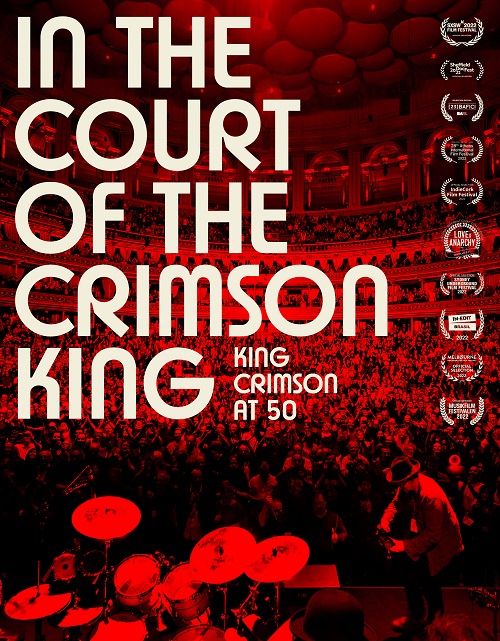You’d have thought a proper documentary would have already been made about King Crimson. Then again, this is not your typical band. Like everything associated with the group and, more specifically, leader Robert Fripp, things tend to turn around at a far more whimsical, discretionary pace. Indeed, the Crimson legacy is heavily guarded, and its course can change direction on a swizzle stick. Like its subject matter, In The Court Of The Crimson King, King Crimson At 50 avoids a linear approach, ebbing and flowing, jumping back and forth. You’re never quite sure where it’s going next. That’s because it’s not so much about the history of the band as it is about a working band that happens to have a rather capricious history.
Produced, filmed and directed by Toby Amies, In The Court Of The Crimson King, King Crimson At 50 apparently started out as your garden-variety rock doc, but morphed into what Fripp describes as “a grown-up film about working players living, dying, laughing, playing…” That’s a fairly accurate assessment, though the living and dying are ubiquitous, the laughing’s a little dry, and the playing incandescent. Hearing former King Crimson members like multi-instrumentalist Ian McDonald, drummer Michael Giles, lyricist Pete Sinfield, drummer Bill Bruford, bassist Trey Gunn, percussionist Jamie Muir, and guitarist and singer Adrian Belew bemoan the expectations of Fripp paradoxically underscores their gratitude for being part of the band. Really, the only member who seems to have a full understanding of Fripp’s motivation is Bill Rieflin. The drummer turned keyboardist (the group’s first and final keyboardist) eloquently shares his story, which sort of rides shotgun alongside the main narrative. The bond with Fripp (“the only personal friend who’s been in King Crimson,” the guitarist states without mincing) is especially poignant in light of Rieflin’s battle with colon cancer, which he lost in 2020.
In addition to Rieflin, several other Crimson alumni have passed on, including the aforementioned McDonald, along with Greg Lake, John Wetton, Boz Burrell, Ian Wallace and Gordon Haskell — none of whom garnered a mention in the film until the final credits rolled. There’s a brief overview of the band’s beginnings in 1969, though little to be said about the various incarnations that followed in the 70s. As part of the 80s lineup, Bruford, Belew and bassist Tony Levin all have a say, but what happened between then and more recently is largely ignored. Mostly what In The Court Of The Crimson King, King Crimson At 50 focuses on is the band’s 50th year — specifically 2019 — and its active members at the time, which included Fripp, Rieflin, Levin, Mel Collins (horns and woodwinds), Jakko Jakszyk (guitar and vocals), and drummers Gavin Harrison, Pat Mastelotto and Jeremy Stacey.
Once you get past the film’s parameters, it’s difficult to not get pulled in by its numerous segues, non-sequiturs (How about a Crimson-loving nun?), and granular attention to the philosophical nuances and subtleties of the music — from keeping the guitar tuned and strung to a lot of warming up at home, on the road and backstage, to the precision of execution, the pitfalls of counting, and the magnitude of making mistakes. It’s really about “capacity” as far as Fripp is concerned. Amies endures the guitarist’s synchronic attacks of verbal abuse. He even snipes at the director when he’s interviewing Jakszyk (whom, we learn, once had a dog named “Fripp”). It all validates Robert Fripp’s unique character — a life of success marred by suspicion, ruthlessness, and obstinance.
You won’t see any full performances (just snippets) from King Crimson in this doc, but by the end of it, you will get a full and clear picture of what King Crimson is about, and how it functions and operates. From Fripp’s perspective, it’s equally as much about silence (of which the musician is a master) and space as it is about song and sound. From everyone else’s perspective — members, admirers and fans, alike — it’s more about picking up on Fripp’s sense of musicality, while dealing with his eccentricities and rigid personality. While much of In The Court Of The Crimson King, King Crimson At 50 traces Robert Fripp’s footsteps, it ultimately captures a band in constant motion, whose striking imprint somehow overcomes all the obstacles that invariably get in the way, even as it barrels through a continuum without any challengers to the throne.
~ Shawn Perry




















